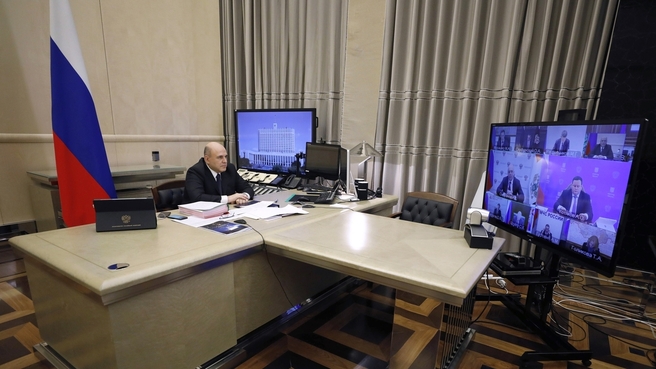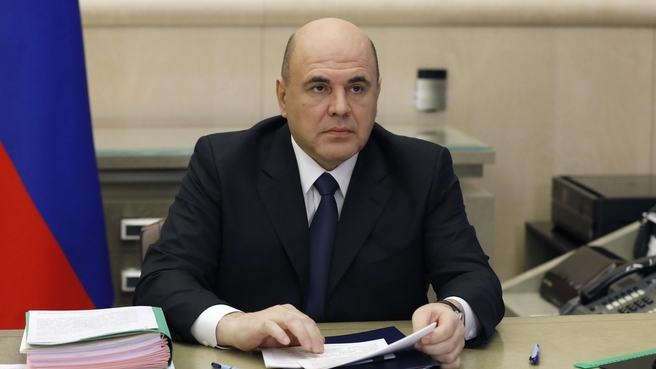The first issue on the agenda concerns the execution of the federal budget in 2019. The meeting was held via video conference.
Mikhail Mishustin’s opening remarks
From the transcript:
Mikhail Mishustin: Good afternoon, colleagues. I would like to remind you that on Tuesday we reported to the President on progress regarding incentive payments to doctors and other medical personnel who are providing assistance to coronavirus patients. The main requirement is to transfer all these payments to the assigned individuals as soon as possible.
The latest adjustments and explanations regarding these presidential benefits have been provided to the regions. There is no reason for delay, and it is not necessary to calculate how many hours medics spend with the patients. The benefits will be paid out because of the very fact that they are working with coronavirus patients. The payments for April must be made in full, and some regions have already started paying the benefits for May. The Healthcare Ministry and the Federal Treasury should closely monitor this so that all medical workers and ambulance drivers receive the presidential benefits they are entitled to. I am also asking you to work together with the Communications Ministry to review and promptly deal with all requests regarding this that have been posted on the Public Services Portal, as well as to give me daily updates.
Today we will be discussing the execution of the federal budget in 2019. Budget revenues amounted to more than 20 trillion roubles and expenses to over 18 trillion roubles. Budget revenues exceeded the planned figure by approximately 220 billion roubles. Finance Minister Anton Siluanov will deliver a detailed report regarding this. The accumulated resources and the measures we are taking now will suffice to reinforce the stability of the budgetary system and provide support to people and businesses.
The next issue on our agenda is the simplification of procedures related to the state cadastral register and the registration of rights. Today we will discuss amendments to the related legislation. They are aimed, in part, at accelerating the state registration of contracts for co-investment in residential housing construction projects. Some requests that are not connected with the transition and restriction of rights can be submitted via personal accounts without a reinforced electronic signature. Personnel at the Public Services Portal will provide the necessary identification of the rights holder.
One more innovation concerns veterans and disabled of the Great Patriotic War, children with disabilities, those disabled since childhood (1st category) and other persons with disabilities (1st and 2nd categories), who will not have to pay for visits by workers of the Federal Service for State Registration, Cadastre and Cartography (Rosreestr). The state will cover these expenses.
We will also continue to support industries and enterprises that have been affected by the coronavirus. Acting on instructions by the President, we will allocate 25 billion roubles to support the automobile industry, 5 billion of which will be earmarked for the purchase of ambulances. In addition to this, funds will be allocated for easy-term car loans and leasing, as well as to finance advance purchase contracts for Russian-made vehicles for corporations and companies with state participation.
In accordance with the President’s instructions, we will allocate 970 million roubles to the Murmansk Region so that it can construct and equip an Emergencies Ministry field hospital. You probably know that the situation in the region is serious, with many coronavirus patients who need to receive high quality medical assistance without delay.
I am giving the floor to Finance Minister Anton Siluanov, who will report on the first issue on our agenda.
Anton Siluanov: Mr Mishustin, colleagues,
Before I get into budget performance figures, I would like to say a few words about last year’s macroeconomic indicators.
The GDP growth rate was 1.3 percent, while the inflation rate was 3 percent, which is below the projected rate of 4 percent. The price of Urals oil was somewhat lower than planned in the budget at $63.80 per barrel. Let me remind you that we factored a price of $70 per barrel into the budget. The rouble exchange rate was steady. By following a budget policy in keeping with the budget guidelines, we were able to avoid having to cut spending due to declining oil and gas revenue. On the contrary, higher non-oil and gas revenue enabled us to increase spending.
What were the priorities in using these revenues? We used them on our priority undertakings as outlined in the presidential address. First and foremost, we used this money to help families with mortgages, as well as for co-funding regional pension supplements, and a number of other spheres that the President designated as priorities.
In addition to this, we provided more than 60 billion roubles to the Russian regions, as well as co-funded transport infrastructure maintenance expenses. I am referring to railway and road infrastructure.
Last year, we had a budget surplus equal to 2 trillion roubles, which enabled us to channel more funds into the National Wealth Fund, and in 2020 we are using these funds to offset the decline in oil and gas revenue. Taking into account last year’s transfers, as of 1 May 2020 the National Wealth Fund held 12.4 billion roubles, or almost 11 percent of GDP. By following this budget policy, we have been able to build a safety margin for this year and use these funds to offset the decline in revenue we are currently witnessing.
Let me say a few words on spending. In the material that we have submitted, you can see performance data on state programmes and national projects for last year. I will tell you right away that overall we have reached the indicators as set forth in the national projects.
The Government was asked to pay special attention to a number of important objectives. In the social sector, we created almost 500 medical and obstetric centres and outpatient medical stations. Another important result in the social sector was that we relocated about 50,000 people from sub-standard housing, bought more than 16,000 units of forestry tools and fire-fighting equipment for managing forest fires, and also connected 17,000 social institutions to the internet, etc.
This year offers a better environment for carrying out national projects. Let me remind you that in late 2019 we transferred 95 percent of allocations under the budget commitment limits for the national projects. Compared to the preceding year this indicator was just 25 percent. Because of this, we have every reason to believe that we will be able to reach the indicators set forth in the national projects for this year.
Overall, 94 percent of spending under the adjusted financing plan was executed. Of course, not all the ministries or agencies had high budget performance indicators. A number of agencies have to pay more attention to budget execution, including the Ministry of Digital Development, Communications and Mass Media, the Federal Agency for Air Transport, Roscosmos, the Federal Agency for Maritime and River Transport and the Ministry of Construction who were below the national average in terms of budget execution last year.
Last year, we also pointed to the failures in engaging budget appropriations. All our colleagues are aware of these figures: we have 1.1 trillion roubles on the balance, which has increased 10 times over the past 7 years. I have to say that we amended the budget laws in order to create the right to use these funds as originally intended. Unfortunately, many of our colleagues thought that this amendment enabled them to pay less attention to using up budget appropriations in full in a given financial year.
Mr Mishustin, you instructed us this year to pay more attention to budget performance and engage 100 percent of the allocated sums. We cannot allow the situation we saw last year to repeat itself in 2020. These spending targets have to be executed in full, since we have to cover the balance with borrowings. Without these borrowings, we could have reduced spending on debt servicing and used about 75 billion roubles for other purposes instead of using this money on interest payments, as is now the case.
It is even more important now to manage government spending more effectively because of the need to concentrate financial resources to support the economy and address social needs. We should either channel resources to boost the reserve fund, and use it to fulfil our priority tasks as part of our economic support packages, or we should redistribute them.
We also need to review the progress our colleagues have made in the execution of the budget as of 18 May – the Ministry of Communications and Mass Media, the Ministry of Transport, the Ministry of Education, the Federal Tourism Agency, the Federal Agency for Youth Affairs. As of this last reporting date, their figures are below the average progress in the federal budget execution.
Now a few words about how the regional budgets have been executed. The regions have generally fulfilled their obligations. Their consolidated budgets have been executed with a surplus of almost 5 billion roubles, in 50 constituent regions of the Russian Federation. And we can see that, most importantly, the regions continued to show a decrease in their debt, the debt burden. Their total debt burden to revenue ratio amounted to about 22 percent. This is the lowest level in recent years, and this allows us to pursue a sustainable regional budget policy this year.
Colleagues, the budget execution has been generally reviewed by our supervisory bodies. I would like to ask you to approve the draft Federal Law On the Execution of the 2019 Federal Budget. After today’s decision, we will send this bill to the State Duma.
Mikhail Mishustin: Do you have any proposals, comments or questions? I would like to acknowledge this serious and systematic work of the Government, and the Ministry of Finance. What is very important – as Mr Siluanov mentioned, we have seen a surplus of about 2 trillion, and revenue more than 1 percent above the projected target.
I also consider it very important that our non-oil-and-gas revenues amounted to more than 60 percent, and to the best of my knowledge, in 2018, it was about 53 percent. The total tax arrears are also lower, including federal taxes and fees, and more. This means additionally 90 billion roubles. I would say this high-quality professional work has, among other things, provided us with the resources and reserves necessary, in particular, for the measures that we are taking today, primarily on behalf of the President, the economic packages to support businesses and help people. So my proposal is to approve.










